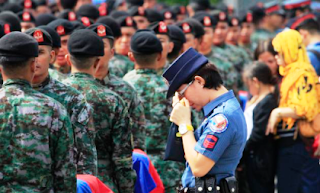The death of 44 police officers from the Special Action Forces (SAF) of the Philippine National Police (PNP) has stunned the nation two weeks after it happened and generated an emotional call for a full-blown war with the Islamic militants in the South.
More than 300 SAFs were supposed to serve arrest warrants for high-ranking terrorists, Jemaah Islamiyah-affiliated and improvised-explosive-device experts Zulkifli Abdhir (also known as Marwan) and Basit Usman. Unfortunately, the mission led to the deaths of 44 members of SAF, 16 from the Moro Islamic Liberation Front (MILF) and Bangsamoro Islamic Freedom Fighter (BIFF) and several civilians.
What angered many were allegations that the Islamic militants deliberately killed off the police officers, who were outnumbered, cornered, outgunned and even tried to surrender. The sentiments are understandable, but the whole cost of waging a war has not really been thought of.
Marwan may have been killed, but Mamasapano town Mayor Benzar Ampatuan said a local farmer’s daughter and two other men were also found dead in their homes after the fighting. these are the unreported and usually underestimated civilian cost that usually accompany military and police operation against both the MILF and BIFF.
"Their wives said they were hit in the crossfire," Ampatuan told Agence France-Presse, adding that five other residents of the corn-farming region were also wounded.
In total, more than 60,000 deaths, 2 million internal refugees, 535 mosques destroyed, 200 schools demolished, 35 cities or towns damaged during the Mindanao fighting from 1970 to 1996. It is also estimated that the Philippine government spent PhP 76 billion fighting the Muslim insurgents. During the so-called "all-out war" of then President Joseph Estrada against the MILF in 2000, another PhP 6 billion came out of state coffers (Alamia, in PCIJ, 2012).
That, ladies and gentlemen, is only a superficial accounting of the cost of the conflict in Mindanao. Numbers can never tell the full story of how wars impact human lives. To those who are itching for war because of the latest incident, to those who now want to scuttle the peace process even before all the relevant facts surrounding the tragic incident are known, have you given this some thought?
Are the lives of countless civilians who will be inevitably caught in the crossfire once large-scale hostilities resume any less valuable - and thus constitute an acceptable cost - in your desire to even the score with the rebels? I'm sorry to say this but I don't think you really love your country. For the national interest to be served we will need more than your display of machismo.
More than 300 SAFs were supposed to serve arrest warrants for high-ranking terrorists, Jemaah Islamiyah-affiliated and improvised-explosive-device experts Zulkifli Abdhir (also known as Marwan) and Basit Usman. Unfortunately, the mission led to the deaths of 44 members of SAF, 16 from the Moro Islamic Liberation Front (MILF) and Bangsamoro Islamic Freedom Fighter (BIFF) and several civilians.
What angered many were allegations that the Islamic militants deliberately killed off the police officers, who were outnumbered, cornered, outgunned and even tried to surrender. The sentiments are understandable, but the whole cost of waging a war has not really been thought of.
Marwan may have been killed, but Mamasapano town Mayor Benzar Ampatuan said a local farmer’s daughter and two other men were also found dead in their homes after the fighting. these are the unreported and usually underestimated civilian cost that usually accompany military and police operation against both the MILF and BIFF.
"Their wives said they were hit in the crossfire," Ampatuan told Agence France-Presse, adding that five other residents of the corn-farming region were also wounded.
In total, more than 60,000 deaths, 2 million internal refugees, 535 mosques destroyed, 200 schools demolished, 35 cities or towns damaged during the Mindanao fighting from 1970 to 1996. It is also estimated that the Philippine government spent PhP 76 billion fighting the Muslim insurgents. During the so-called "all-out war" of then President Joseph Estrada against the MILF in 2000, another PhP 6 billion came out of state coffers (Alamia, in PCIJ, 2012).
That, ladies and gentlemen, is only a superficial accounting of the cost of the conflict in Mindanao. Numbers can never tell the full story of how wars impact human lives. To those who are itching for war because of the latest incident, to those who now want to scuttle the peace process even before all the relevant facts surrounding the tragic incident are known, have you given this some thought?
Are the lives of countless civilians who will be inevitably caught in the crossfire once large-scale hostilities resume any less valuable - and thus constitute an acceptable cost - in your desire to even the score with the rebels? I'm sorry to say this but I don't think you really love your country. For the national interest to be served we will need more than your display of machismo.

